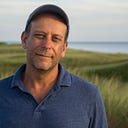Member-only story
The Four Fish I Eat Even After Watching Seaspiracy
I wrote the book “Four Fish” but now I eat a different four.
Seaspiracy, the buzzy, frenetic, slick, sloppy, confused and gripping documentary that premiered on Netflix in 2021, is often wrong but mostly right. Led by Ali Tabrizi, and produced by the maker of Cowspiracy, Kip Andersen, the film takes you on a bumpy ride with pit stops at every imaginable ocean horror: from the slaughtered dolphins of Taiji in Japan to the sea slaves of the South China Sea, north to the fetid corpses of disease-stricken Scottish farmed salmon and out into the plastic-strewn blue of the great Pacific garbage patch. It then dumps you at the side of the road, kicks you in the ribs and shouts: “And, remember — stop eating fish!”
There is merit in keeping a toe in the water. We already befoul our oceans at a tremendous level. Were we to cut our food relationship with the seas entirely, I fear we would befoul them even more
Not surprisingly, many fishers, conservationists and fisheries scientists feel similarly assaulted. Indignant posts abound from nonprofits to fisher’s associations asserting that, contrary to the film’s claims, sustainable fishing is possible…
